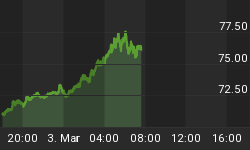With today's release of "final" (until revised yet again) Q4:2007 GDP, the Commerce Department also issued its estimate of Q4 corporate profits. The profits data are not encouraging. Chart 1 contains year-over-year percent changes in annual averages of both total before-tax corporate profits from current production (the Commerce Department's equivalent of operating profits) and domestically-generated before-tax profits. The total profits data includes profits earned by U.S. corporations earned from foreign operations. With the dollar having fallen in 2007, profits from foreign operations get "inflated" when translated back into dollars. That is, when the dollar is falling versus other currencies, say the euro, then one euro of profits means more dollars of profits. Total profit growth, including earnings from overseas operations, grew at 2.7% in 2007 versus 13.2% in 2006. The 2007 total profit growth was the slowest since 2001, when the economy was in an official recession. Profits from domestic operations contracted by 3.0% in 2007 - the first contraction, again, since 2001. As Merrill Lynch economist, David Rosenberg, has pointed out, U.S. corporate hiring and U.S. corporate capital spending depend on U.S. generated profits, not profits generated overseas.
Chart 1
There has been some talk that the recent weakness in corporate profits is due to the problems being encountered by the financial sector. Excluding the financial sector, everything is rosy. Is this an extension of core inflation - in this case, take out the things that are going down? Did these same "analysts" who now want to exclude the financial sector also exclude it when financial profits were soaring? Well, it really does not matter. As Chart 2 shows, both financial sector as well as nonfinancial sector profits fell in 2007. Nonfinancial sector profits fell 3.7% in 2007, the first decline since 2001. Financial sector profits fell 1.8% in 2007, the first decline since 1998.
Chart 2
The weak growth in 2007 total U.S. corporate profits and the contraction in 2007 U.S. domestically-generated profits have negative implications not only for 2008 U.S. hiring and capital spending, but also for 2008 corporate stock buybacks. Chart 3 shows the "net retirement" of U.S. domestically-issued corporate equities. In 2007, U.S. corporations retired a record net $677 billion of their own equities. Had this gargantuan amount of securities not been demanded by corporations themselves, would the U.S. stock market have seen an increase in value in 2007? With profits now contracting, how will corporations continue to reduce the supply of their equities? Borrow to fund share buybacks? Perhaps. But Chart 4 shows that with credit now being more appropriately priced, it will cost corporations more to borrow.
Chart 3
Chart 4
















